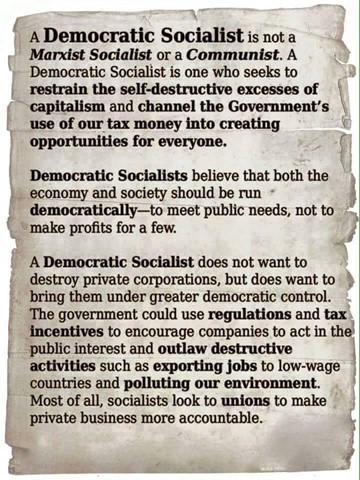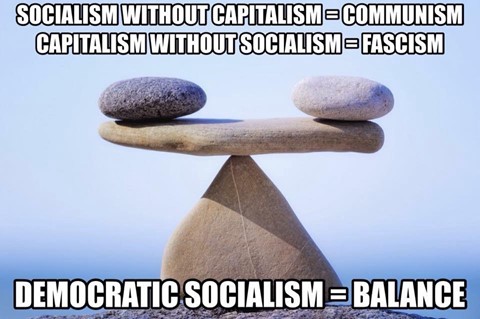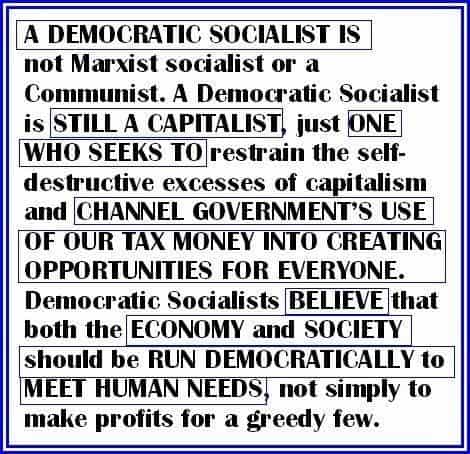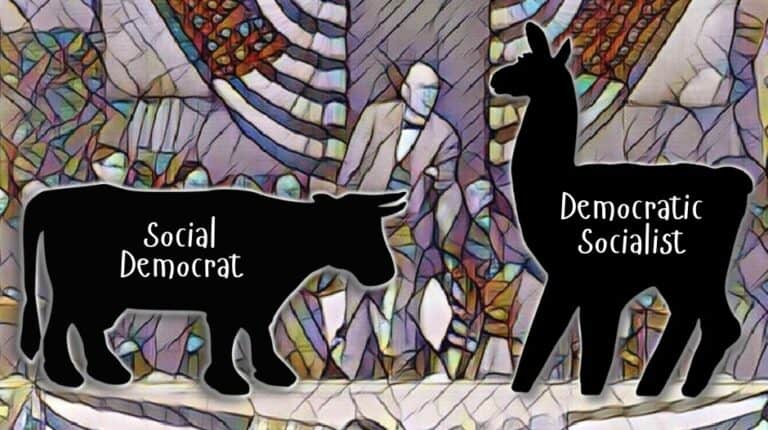The true democrat is of necessity a socialist as well.
– William Liebknecht
It is important to use correct definitions when we discuss ideas, politics, and ideologies. Cows and llamas are both furry mammals that produce milk that is consumable by humans. Yet they are distinctly different animals. If I call a cow a llama or vice versa, people will rightfully disagree with me. Just because it is my opinion that a cow is a llama does not make me inherently correct. There are real definitions and distinctions between these two types of animals. If people go around labeling things incorrectly, the result is mass confusion. This has happened with the terms Democratic Socialism and Social Democracy. It is impossible to have an ideological discussion in good faith when people have been misled on the actual meanings of these terms.
Social Democracy vs. Democratic Socialism
Social Democracy and Democratic Socialism are often confused with each other, even though they are as different as cows and llamas. This is a common mistake that is made on social media. It has not been helped by numerous memes claiming to define Democratic Socialism.

Many memes floating around social media claiming to define Democratic Socialism are incredibly misleading and inaccurate. Democratic socialism is a very simple concept – it is in the name itself. It is a form of socialism (worker control of the means of production) that is achieved through democratic means (electoral politics). In order to be very clear on this definition, here is the entire entry in The SAGE Glossary of the Social and Behavioral Sciences:
“The key element of democratic socialism is workers’ meaningful participation and control of daily life at work and in the community, with managers elected by and responsible to workers and community members. The focus is on the abolishment of the capitalist system. [italics added] Democratic socialism took root in Europe after World War I. Democratic socialist parties actively participated in government in Great Britain, Germany, Sweden, Belgium, the Netherlands, and other nations where democratic socialism is more accepted than in the United States. Since the 1930s, the United States has been the only industrially advanced capitalist democracy without a large established social democratic or socialist political party. Democratic socialism is not the same as social democracy. The division between social democrats and democratic socialists stems from the former party’s peace with capitalism while concentrating on humanizing the effects of capitalism. Social democrats supported and tried to strengthen the basic institutions of the welfare state, such as pensions for all, public health care, public education, and unemployment insurance. Democratic socialists, on the other hand, have argued that capitalism could never be sufficiently humanized. Their dual task has been to secure socialism against capitalist opposition and secure socialism in a way that develops socialism’s democratic potential. They estimate their success in terms of advances in a democracy before, during, and after a socialist transformation. In short, democratic socialists want socialism to help lay the basis for making major advances in a democracy.”
This definition clearly differentiates between Social Democrats and Democratic Socialists. Today, Social Democracy is illustrated by the Nordic system. It is regulated capitalism with a social safety net. It does not fundamentally change the economic system as does Democratic Socialism. Social Democracy retains the system of capitalism whereas Democratic Socialism replaces it with socialism. It should be no more difficult to distinguish between a Social Democrat and a Democratic Socialist than it is to determine whether an animal is a cow or a llama. Yet the media and politicians have not done an adequate job of clearly differentiating between these two ideologies.
https://www.msnbc.com/velshi-ruhle/watch/what-is-democratic-socialism-1266192963803
In this video, MSNBC lies about Democratic Socialism. Democratic Socialism is socialism, unlike the claims of this video.
In the United States these distinctions between Democratic Socialism and Social Democracy have been blurred. This is in great part due to Bernie Sanders and his inability to draw a clear line between the two. In his presidential campaigns, Bernie did not clearly differentiate between Social Democracy and Democratic Socialism in an apparent effort to make Democratic Socialism more palatable to the masses. There was a certain logic to this due to the amount of anti-socialist propaganda in the United States, but it did no favors to the socialist movement when he attempted to connect Democratic Socialism with the Social Democracies of the Nordic States. In 2019, Bernie gave a speech that was purportedly on Democratic Socialism but in it he praised New Deal liberalism, the reformist approach that saved capitalism.
“Now, we must take the next step forward and guarantee every man, woman and child in our country basic economic rights – the right to quality health care, the right to as much education as one needs to succeed in our society, the right to a good job that pays a living wage, the right to affordable housing, the right to a secure retirement, and the right to live in a clean environment.
We must recognize that in the 21st century, in the wealthiest country in the history of the world, economic rights are human rights. That is what I mean by democratic socialism.”
– Bernie Sanders

What Bernie called for would certainly be progress in the United States, but it stops short of true Democratic Socialism. Economic rights are human rights and the working class has the right to all that it produces; in order to truly be free, the working class must control the means of production. Bernie was correct when he said, “And let me be absolutely clear: democratic socialism to me requires achieving political and economic freedom in every community.” But economic and political freedom require a change in the economic system, not regulations of the inherently exploitative capitalist system. Bernie danced around the edges of Democratic Socialism but failed to make the important distinction between Democratic Socialism and Social Democracy. Bernie made it clear that he was not a capitalist, but for whatever reason, he was unable to deliver a coherent message on what Democratic Socialism actually is.
Other Democratic Socialists have done far better with their messaging than Bernie. Meagan Day of the Democratic Socialists of America (DSA) explained, “Our goal is not to rein in the excesses of capitalism for a few decades at a time — we want to end our society’s subservience to the market.” Another DSA member, New York State Senator Julia Salazar said, “A democratic socialist recognizes the capitalist system as being inherently oppressive, and is actively working to dismantle it and to empower the working class and the marginalized in our society. Socialists recognize that under capitalism, rich people are able — through private control of industry and of what should be public goods — to accumulate wealth by exploiting the working class and the underclass. Functionally, this perpetuates and exacerbates inequality.” And in an excellent article on the difference between Democratic Socialism and Social Democracy, Michael A. McCarthy wrote, “Democratic socialism, on the other hand, should involve public ownership over the vast majority of the productive assets of society, the elimination of the fact that workers are forced into the labor market to work for those who privately own those productive assets, and stronger democratic institutions not just within the state but within workplaces and communities as well. Our characterization of democratic socialism represents a profound deepening of democracy in the economy.” These are very accurate descriptions of what Democratic Socialist principles are and breaks through the muddled information that Bernie conveyed in his speeches and campaigns.
Democratic socialism proceeds from the principle that the political and social questions are inseparable; proudly rejecting any pact with the existing order, it is determined to win a democratic state for a society that will be organized on a socialist basis. Only we, the adherents of this socialism, are justified in calling ourselves a socialist party.
– William Liebknecht
This distinction between Social Democracy and Democratic Socialism is important. Capitalists should not be allowed to represent themselves as Democratic Socialists. When New York Congresswoman Alexandria Ocasio-Cortez (AOC) proclaims you can be a capitalist and a Democratic Socialist, she is absolutely wrong.
It is impossible to be a Democratic Socialist and believe in capitalism. AOC is spreading misinformation when she says this and DSA has shown a lack of ideological purity in not holding her to the true definition of Democratic Socialism. While Bernie lacked a clear definition of Democratic Socialism, he was at least very clear that he was not a capitalist. AOC’s statement is far worse for the movement for socialism because it simply is not possible to be a capitalist and a Democratic Socialist. Socialism and capitalism are antithetical economic systems.

While Democratic Socialism is not specifically Marxist, it would not exist without Marxism and draws much from Marx and Engels’ theories. As DSA says, “The democratic socialist vision does not rest upon one sole tradition; it draws upon Marxism, religious and ethical socialism, feminism, and other theories that critique human domination.” Social Democracy is not in any way Marxist as it still maintains the capitalist system. As Roger Morgan explains in Social Democracy in Europe: A Comparative Examination:
By 1945, when the postwar years brought a renewed period of Social Democratic government in large parts of Western Europe, one of the fundamental differences separating social democracy from Communism (or indeed from left-wing socialism) had become absolutely clear: Communists and many others continued to define ‘socialism’ in the traditional terms of ownership of the means of production. Parties like the German, Austrian or Scandinavian Social Democrats, who had decisively abandoned this view to embrace the idea of a mixed economy, including both public and private sectors, were denounced by the Left (including the Communists and significant elements in the Socialist Parties in France, Italy, Britain and Greece) for ‘managing the capitalist system’ rather than making the transition to ‘socialism’.
This definition of Social Democracy is backed up by well-known economist Jeffrey Sachs. On the Freakonomics Podcast, Sachs explains this in a conversation with Stephen Dubner:
SACHS: A socialist economy, in the traditional usage of economics and in political history — though it’s a term that has been used for all sorts of things — generally means an economy organized around social ownership, which might mean state ownership, or it could mean a cooperative ownership, or in some views it has meant worker ownership, or in other interpretations, citizens’ ownership. But the idea is that it’s some kind of social ownership of the means of production.
Stephen DUBNER: When you talk about, let’s say, a Nordic economy — Norway, let’s just pick as a socialist democracy, what component of that economy is socialist? SACHS: Well, the Nordic economies are not socialist democracies. They call themselves social democracies. That’s a very big difference. They do not call themselves socialist, in general, because most of the production, most of the businesses in the economy, are private, corporate ownership. But what they do, which is quite different from the United States, is that they collect far more in total tax revenues, and then use those additional revenues to provide far more public services than the United States provides.

While Social Democrats no longer believe in socialism but rather support regulated capitalism with a strong social safety net, Democratic Socialists still maintain their identity as socialists. Article II of the Democratic Socialists of America’s Constitution and Bylaws clearly states:
We are socialists because we reject an economic order based on private profit, alienated labor, gross inequalities of wealth and power, discrimination based on race, sex, sexual orientation, gender expression, disability status, age, religion, and national origin, and brutality and violence in defense of the status quo. We are socialists because we share a vision of a humane social order based on popular control of resources and production, economic planning, equitable distribution, feminism, racial equality and non-oppressive relationships. We are socialists because we are developing a concrete strategy for achieving that vision, for building a majority movement that will make democratic socialism a reality in America. We believe that such a strategy must acknowledge the class structure of American society and that this class structure means that there is a basic conflict of interest between those sectors with enormous economic power and the vast majority of the population.
To further back this up, their page on What Is Democratic Socialism says:
Capitalism is a system designed by the owning class to exploit the rest of us for their own profit. We must replace it with democratic socialism, a system where ordinary people have a real voice in our workplaces, neighborhoods, and society.
To equate Democratic Socialism, an ideology that clearly calls for changing the economic system from capitalism to socialism, with the welfare-state capitalism of Social Democracy is as absurd as calling a cow a llama. These ideologies are two very different beasts. It is necessary to understand the distinction between these two very different systems in order to propel the socialist movement forward.
Works Cited:
The SAGE Glossary of the Social and Behavioral Sciences, edited by Larry E. Sullivan, SAGE Publications, 2009. ProQuest Ebook Central.
Social Democracy in Europe: a Comparative Examination Author(s): Roger Morgan Source: Government and Opposition , WINTER 1982, Vol. 17, No. 1 (WINTER 1982), pp. 22-34 Published by: Cambridge University Press Stable.


2 thoughts on “A Cow is Not a Llama – A Social Democrat is Not a Democratic Socialist”
It is inevitable today that we will have a pluralistic Left. Social Democracy meant different things to different people. Pre-1914. from the Erfurt Program of 1891 onward German Social Democracy was Marxist and Revolutionary Social Democracy. In 1914 most Social Democratic Parties went through a crisis and ended up supporting War. This is what led both Rosa Luxemburg and Lenin to split decisively with the main social democratic movement. And in fact Lenin had already split from the Mensheviks and enunciated his notion of ‘the vanguard Party’. As against Luxemburg’s critique, most of the Communist movement which followed took their cue from Leninism ; and later Stalinism. But in Austria for instance the Social Democrats remained a revolutionary, democratic and ideologically communist force. Before 1891 the social democratic movement was openly divided between Marxism and the viewpoint of Lassallean state-facilitated co-operatives. So many people out there seem to think that what makes Democratic Socialism democratic is that it has made its peace with capitalism. We must not accept this. Capitalism is not merely ‘markets’ ; it is the system characterised by the effective rule of capital, its logic, and its priorities, interests and values. There is currently ‘no comprehensive way out’ of capitalism ; but much of the Marxist critique still holds up to criticism ; and provides a rationale for incremental socialisation of strategic sectors. A modern Left should have competing definitions of socialism and social democracy ; and for many of us the terms may become interchangeable – if we abandon ‘Third Way Centrism’ for the ‘revolutionary social democracy’ of old. The term ‘Democratic Socialism’ is still useful to get people thinking, though – when otherwise they would be closed-minded, and consider socialism to simply infer the historical experience of Stalinism. But there is truth as well in the argument that real socialism is inherently democratic ; and Stalinism did not live up to Marxist and socialist values. But sometimes the wealthy take the side of socialism – either for ethical or historical reasons. Engels owned factories in England, and used the cash flow to support Marx. Capitalists who do not try and co-opt the movement for capitalism; but rather support socialism out of conviction – ought be accepted as invaluable supporters of our movement. These are capitalists who would like to be superseded by history ; but who are willing to lend a hand in the interim.
One can certainly be a social democrat and NOT a Marxist NOT a socialist NOT a revolutionary.
Let me put forward some alternative views, and some book references for those interested in becoming social democrats.
In fourth form I read Homage To Catalonia. In fifth form impacted by traumatic WWII propaganda I briefly projected to anarchism of a simplistic naive kind that at least someone stood up against the wicked war crimes thenabouts. But influenced by social democrat propaganda I burnt out and became committed to parliamentarianism. The idea that in one’s life one votes for parliament maybe ten or twenty times and that democracy was the solution to class conflict. That a paternalistic benevolent government might through proper consideration of social grievances address said grievances and solve social problems via legislation and committee work.
I am very disappointed with the corruption and lack of good government in today’s Australia particularly at federal level. It appals me the buying of political parties by lobbyists and vested interests.
However I agree that one can be a social democrat without being a revolutionary. It’s about means to an end. There is parliamentarianist organisation as a method, and there is the road of the gun and bomb.
Reformists prefer to organise non violently and via parliamentary means change society for the better.
Some books:-
Crick, In Defence Of Politics
Orwell, 1984
Orwell, Animal Farm
Mill, Considerations On Representative Government
Popper, The Open Society And Its Enemies
Popper, THe Poverty Of Historicism
I am propably someone that the author above considers not a socialist. But I remain interested in social democrat methods of non violent parliamentary action to better society.